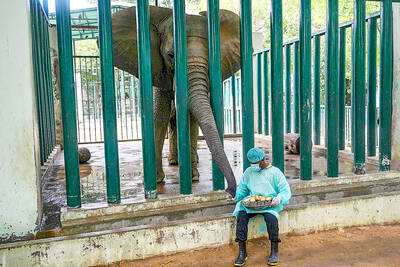When former porn star Mana Izumi got her first tattoo at 18, she was not trying to rebel or shatter any taboos — just trying to copy Japanese pop diva Namie Amuro’s beach-bronze “surfer chick” look.
In Japan, where tattoos have for centuries been demonized for their association with criminals, Izumi, 29, turns heads with her copper tan, bleach-blonde bob and array of designs inked across half of her body.
“I wasn’t really an Amuro fan, but I thought her tattoos were cute,” Izumi said. “When my mom first saw my tattoo she burst into tears and I thought my dad was going to kill me. But I like being a bit different.”

Photo: AFP
Tattoos still provoke deep-rooted suspicion in Japan as the country prepares to host the 2020 Tokyo Olympics. People with body ink are refused entry to public swimming pools, bathing spots, beaches and often gyms, while visible body art can be harmful to job prospects.
“It’s pathetic the way people discriminate against tattoos,” Izumi said while getting a US$500 Aztec skull inked onto her leg.
“People might think I look a little scary,” she added, taking a drag on her cigarette. “But I don’t regret getting inked.”

Photo: AFP
Japan has long had a prickly relationship with tattoos.
In the 17th century, criminals were branded as a form of punishment, while today Japan’s yakuza mobsters pledge their loyalty with traditional, full-body irezumi tattoos.
As Japan opened up to the outside world in the 1800s, tattoos were outlawed — along with snake-charming and public nudity — because the Japanese feared that outsiders would think they were “primitive,” said Brian Ashcraft, author of Japanese Tattoos: History, Culture, Design.
At the same time, European royalty would come to Japan to secretly get inked, so coveted were the country’s tattoo artists.
The ban lasted until 1948, when the occupying US forces lifted it, but the stigma remains in Japan.
“They look at tattoos and they think ‘yakuza’ — instead of admiring the beauty of the art form,” Ashcraft said. “Until that changes, tattooing will continue to exist in a gray zone.”
Authorities turn a blind eye to the ban for the most part, but a recent crackdown involving several police raids and fines has plunged Japan’s tattoo industry into confusion.
Meanwhile, a potentially game-changing legal battle recently ended after Osaka tattooist Taiki Masuda was arrested in 2015 for violating an obscure law that dates back almost 70 years.
The 30-year-old was fined ¥300,000 (US$2,648) under the Medical Practitioners’ Act, which forbids anyone other than a doctor from performing medical procedures.
A 2001 Japanese Ministry of Health, Labor and Welfare notice ruled that tattooing was medical work, as it involves needles, technically criminalizing Masuda’s job.
He decided to fight the law and last month, a court overturned his previous guilty verdict after a lengthy and controversial appeal process.
“There’s no legal framework regulating the tattoo industry in Japan,” Masuda said. “Livelihoods are at stake — that’s why I had to fight it, to hopefully help legalize tattooing.”
Masuda’s struggle polarized opinion among Japanese tattooists, who are estimated to number as many as 3,000.
Noriyuki Katsuta, a member of “Save Tattooing in Japan,” a non-profit cofounded by Masuda, called his arrest “a human rights violation.”
However, many older artists are fiercely protective of tattooing’s underground roots and resist the idea that it should become a legitimate profession.
“Tattoos should have a dash of the outlaw about them,” said Horiyoshi III, who slammed Masuda’s actions as “provocative” and unhelpful. “It’s like adding pepper to noodles — if you just ate pepper it would be too hot, but as a spice it adds flavor.”
Katsuta said he estimates that between 500,000 and 1 million Japanese — or one in every 100 or 200 people — have tattoos.
Japan’s squeamishness about tattoos will be put to the test at the Tokyo Olympics, and before that at next year’s Rugby World Cup, both set to bring an influx of foreign visitors — including athletes with body art.
“I don’t know how much the Olympics is actually going to change opinions,” Ashcraft said, adding that Japanese TV still blurs out tattoos.
“When people look at foreigners with tattoos they kind of see that as foreign culture,” he said.
At the root of much of the prejudice toward tattoos in Japan is the ancient Confucian idea that defacing the body inherited from one’s parents is disrespectful, Ashcraft said.
“I don’t think people are actively thinking that it’s dirty anymore,” he added. “But I do think that collective consciousness still lingers.”
Izumi has little time for such outdated arguments.
“Among my mom’s generation, anyone tattooed-up like me was thought to be yakuza,” she said. “But when people preach about spoiling the body my parents gave me, it really makes me sick. I don’t feel I have to explain myself to anyone.”

NO EXCUSES: Marcos said his administration was acting on voters’ demands, but an academic said the move was emotionally motivated after a poor midterm showing Philippine President Ferdinand Marcos Jr yesterday sought the resignation of all his Cabinet secretaries, in a move seen as an attempt to reset the political agenda and assert his authority over the second half of his single six-year term. The order came after the president’s allies failed to win a majority of Senate seats contested in the 12 polls on Monday last week, leaving Marcos facing a divided political and legislative landscape that could thwart his attempts to have an ally succeed him in 2028. “He’s talking to the people, trying to salvage whatever political capital he has left. I think it’s

Polish presidential candidates offered different visions of Poland and its relations with Ukraine in a televised debate ahead of next week’s run-off, which remains on a knife-edge. During a head-to-head debate lasting two hours, centrist Warsaw Mayor Rafal Trzaskowski, from Polish Prime Minister Donald Tusk’s governing pro-European coalition, faced the Eurosceptic historian Karol Nawrocki, backed by the right-wing populist Law and Justice party (PiS). The two candidates, who qualified for the second round after coming in the top two places in the first vote on Sunday last week, clashed over Poland’s relations with Ukraine, EU policy and the track records of their

UNSCHEDULED VISIT: ‘It’s a very bulky new neighbor, but it will soon go away,’ said Johan Helberg of the 135m container ship that run aground near his house A man in Norway awoke early on Thursday to discover a huge container ship had run aground a stone’s throw from his fjord-side house — and he had slept through the commotion. For an as-yet unknown reason, the 135m NCL Salten sailed up onto shore just meters from Johan Helberg’s house in a fjord near Trondheim in central Norway. Helberg only discovered the unexpected visitor when a panicked neighbor who had rung his doorbell repeatedly to no avail gave up and called him on the phone. “The doorbell rang at a time of day when I don’t like to open,” Helberg told television

A team of doctors and vets in Pakistan has developed a novel treatment for a pair of elephants with tuberculosis (TB) that involves feeding them at least 400 pills a day. The jumbo effort at the Karachi Safari Park involves administering the tablets — the same as those used to treat TB in humans — hidden inside food ranging from apples and bananas, to Pakistani sweets. The amount of medication is adjusted to account for the weight of the 4,000kg elephants. However, it has taken Madhubala and Malika several weeks to settle into the treatment after spitting out the first few doses they